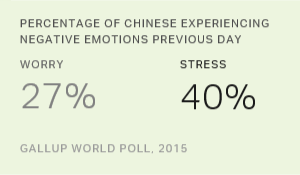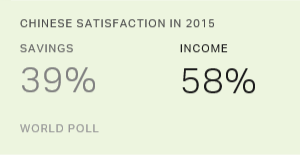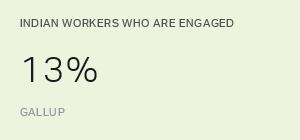Story Highlights
- 27% of Chinese worried and 40% stressed in 2015
- Negative emotions increased the most among rural Chinese
- Basic food and shelter greater concerns in rural areas
WASHINGTON, D.C. -- Feelings of worry and stress are up among Chinese adults, with both climbing in 2015 to the high end of the levels Gallup has measured over the past decade. Twenty-seven percent of Chinese say they worried a lot the previous day, and 40% say they experienced a lot of stress.
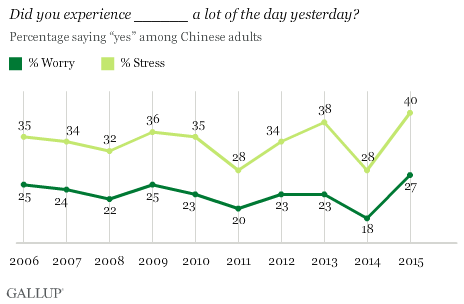
These feelings have increased sharply as Chinese residents' satisfaction with their household income and personal savings dropped precipitously last year amid China's economic slowdown. Personal financial setbacks often lead to increased worry and stress. In addition, the Chinese government is urging greater consumer spending among its citizens as the nation transitions from manufacturing to a modern service economy.
Worry and Stress More Common Among Rural Chinese
Reports of experiencing these negative emotions have increased more among rural residents in China than among city dwellers. Twenty-eight percent of those living in rural farming areas or small villages say they worried a lot the previous day, versus 16% who said the same in 2014 -- an increase of 12 percentage points in one year. A substantial percentage of urban dwellers, 22%, also report feeling worried; however, this is down four percentage points from the previous year.
The broad urban/rural gap also holds true for those who experienced a lot of stress the previous day. Four in 10 rural dwellers (41%) reported feeling a lot of stress the previous day in 2015, an increase of 15 points from 2014. And although roughly the same percentage of urban Chinese (40%) reported feeling a lot of stress in 2015, the increase for city dwellers is just three points from 2014. The considerable increase in stress among Chinese who live in rural areas or small villages suggests they have now pulled even with stressed populations living in large cities.
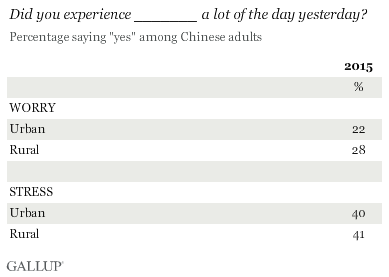
Basic Food and Shelter Are Greater Concerns in Rural China
Concerns about providing basic food and shelter are likely one reason for the urban/rural gaps in worry and stress. Eight percent of rural Chinese say there have been times in the past 12 months when they did not have enough money to buy food for their families, compared with 2% of urbanites saying the same. Similarly, 12% in rural areas say they have not had enough money to provide their families with adequate housing in the past year, nearly twice the percentage reported by city dwellers, 7%, who have struggled to provide housing.
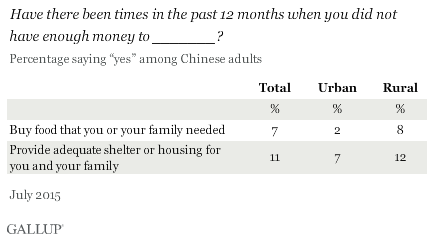
Bottom Line
Anxieties among rural Chinese may be an inevitable byproduct of the slowing economy and structural changes in China's economic policies. For decades, rural Chinese have migrated to work in low-end manufacturing plants, but those jobs are shifting to other Asian countries such as Vietnam and Bangladesh amid China's transition toward a service and high-tech manufacturing economy. Rural Chinese likely worry that their future economic prospects are dimming as modern manufacturing requires more highly skilled employees.
These data are available in Gallup Analytics.
Survey Methods
Results are based on interviews with 4,265 Chinese adults, aged 15 and older, including a national sample conducted face to face in China and an oversample conducted by landline telephone in Shanghai, Beijing and Guangzhou in July 2015. For results based on the total sample of national adults, the margin of sampling error is ±2 percentage points at the 95% confidence level. All reported margins of sampling error include computed design effects for weighting.
For more complete methodology and specific survey dates, please review Gallup's Country Data Set details.
Learn more about how the Gallup World Poll works.
